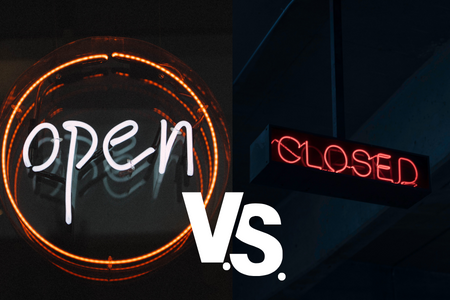Welcome To Our Mortgage Educational Blog About:

Mortgages are loans people commonly take to finance their home purchase and sometimes maintenance for purchase plus improvements. While many see the beauty of your home, they often don’t see the struggle of paying back the principal and interests to your lender.
Open and closed mortgages are both types of mortgages that usually use a fixed interest rate. However, they differ in their interest rates.
Mortgages are for everyone but open and closed mortgages are for different people based on their finances. It is best to choose either one of these mortgages that agree with your income flow.
What is an Open Mortgage?
An open mortgage is a type of mortgage that offers borrowers a flexible repayment of the principal amount, albeit with higher interest rate, without a penalty. It typically allows borrowers to pay back the principal of their loans in a shorter period, usually with a lump sum. It is the best mortgage repayment option for individuals with seasonal heavy cashflow, and those that wish to pay off their loan as soon as possible.
How Do Open Mortgages Work?
To better understand an open mortgage, here’s an illustration.
Mr. Ice wants to buy a home that costs $200,000. He approaches a lender and they agree that he’ll pay his principal and interest in 5 years. However, he requests for an open mortgage since he’s expecting $300,000 in five months. The lender agrees; however, his interest rate will be higher by 1%, Mr. Ice agrees.
After five months, he pays off his principal and has only his interest to pay.
From the illustration, Mr. Ice pays off his principal but at a higher interest rate. However, he’s free of the loan faster than the lender hopes.
Who Should Opt for an Open Mortgage
Open mortgages aren’t for everyone, but you can choose it if:
- You are self-employed
- You’re expecting an increase in your income soon
- Want to pay off your loan as soon as you have the money
What is a Closed Mortgage?
A closed mortgage, also called closed-end mortgage, can be regarded as the traditional mortgage, where the borrower is restricted to paying by a schedule they have agreed on with the lender. A deviation from this payment schedule will lead to a penalty. Lenders will use closed mortgages as default in their dealings.
Closed mortgages have lower interest rates, and are for individuals with a steady flow of income that can be maintained over a long time.
How Do Closed Mortgages Work?
Here’s an illustration to better understand a closed mortgage and how it works.
Ms. Rivers needed to purchase a home and she approached a lender. They reached an agreement that she would pay a 3% interest rate on the $300,000 she wanted to borrow, in 15 years, and she agreed. Monthly, she paid $1, 716.7 to the lender for 15 years, and she became the sole owner of her home.
From the above illustration, Ms. Rivers agrees by signing a document that stipulates that her mortgage is a closed mortgage; however, because she chooses to pay the principal and interest over a long time, her interest rate is lower.
Who Should Opt for Closed Mortgages?
Closed mortgages are available to every borrower. However, they are best for:
- People with jobs that pay a steady income
- People who benefit from paying their loans over a long time.
Which is Better-Open or Closed Mortgages?
Both mortgages are good for their target borrowers. However, they come with their downsides.
An open mortgage allows a borrower to use his building as collateral for another loan as soon as possible. He can also exchange the equity of the building for cash after they repaid the loan. However, the interest rate can be close to 2% higher than it is for a closed mortgage.
A closed mortgage does not allow borrowers access to liquidate the equity of their part of the house’s ownership. However, they have lower interest rates, and help borrowers repay their loans easily.
Conclusion
Mortgages are an important financial help in buying real estate. However, ensure that you choose the right type of mortgage for you.
Are you ready to buy your first home? Reach out to me directly or start your application here: www.sandraforscutt.ca/mortgage-application/
Don’t hesitate to contact us with any questions you may have.
Recent Educational Blogs
First Responder Mortgage Program
Jan 2026 | First Responder Mortgage ProgramAt Metro Mortgage Group, we have deep respect for the everyday heroes of our city — the members of the Edmonton Police Service, EMS, and Fire Rescue Services. Your commitment keeps our community safe, often at great personal...
Pros and Cons of a Home Equity Line of Credit (HELOC)
Dec 2025 | Pros and Cons of a Home Equity Line of Credit (HELOC)If you’re a Canadian homeowner, you’ve probably heard friends or family talk about using a home equity line of credit, or HELOC. People often use it to renovate, consolidate debt, or help kids with school...
What the Latest Bank of Canada Rate Cut Means for Canadian Borrowers and Homeowners
Nov 2025 | What Rate Cut Means for Canadian Borrowers and Homeowners On October 29, 2025, the Bank of Canada made headlines by cutting its benchmark policy rate by 25 basis points. This move brought the policy rate down to 2.25%. For Canadians with mortgages, loans,...



